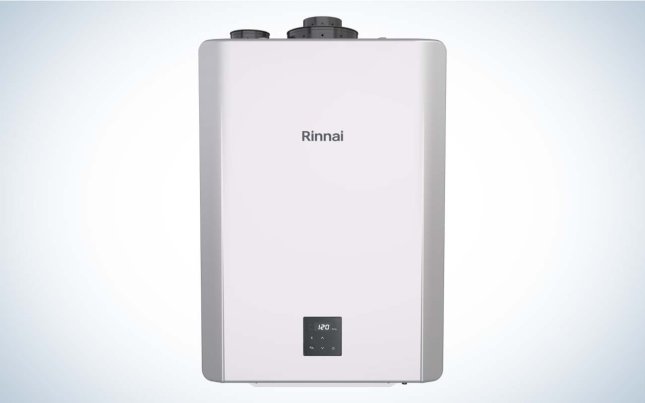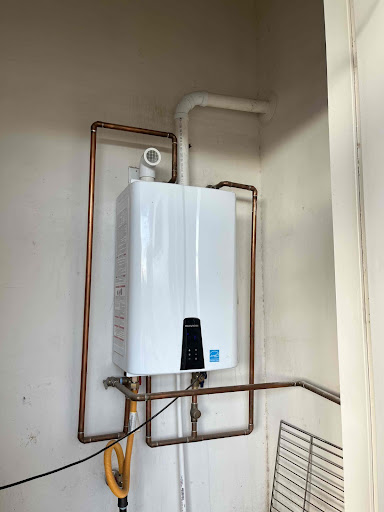Why On-Demand Water Heaters Grant Important Benefits
Why On-Demand Water Heaters Grant Important Benefits
Blog Article
Have you been interested in facts about Unveiling the Hot Trend: The Benefits of Tankless Water?

In a world where ease and efficiency preponderate, it's no surprise that house owners are frequently on the lookout for smarter methods to handle their home's power intake and convenience. One innovation that has continuously acquired appeal is the tankless hot water heater. However what exactly makes these systems stick out from the conventional tank-based designs a lot of us grew up with? Let's dive in and check out the benefits of tankless water heaters, helping you choose if it's time to make the switch in your house.
Intro
Photo this: you step into the shower after a long day, expecting a soothing waterfall of hot water, only to be welcomed by icy beads since the last individual utilized it all up. Noise familiar? Standard water heaters save a set amount of hot water, implying you go to the mercy of that storage tank's supply. Tankless systems, on the other hand, warm water on demand. No more going out mid-shower, say goodbye to fumbling with routines simply to make sure warm water is available.
Understanding Tankless Water Heaters
What Are Tankless Hot Water Heater?
Tankless water heaters, sometimes called on-demand or immediate water heaters, give warm water only as it's needed. As opposed to keeping gallons of pre-heated water, these devices kick right into activity the minute you switch on the tap. Water passes through a heat exchanger, heating up in real-time, indicating you obtain an uninterrupted flow of warm water without the requirement for a big storage tank resting lazily by.
Just how Do They Vary from Standard Solutions?
Conventional heaters hold a reservoir of warm water, utilizing power to keep that tank at a regular temperature level. Tankless units get rid of the standing supply, reducing squandered power and the bulky impact of a big cylinder. Basically, you're upgrading from a "accumulation" state of mind to a "made-to-order" method.
Typical Kinds Of Tankless Units
Tankless hot water heater generally can be found in two selections: gas and electrical. Gas models often tend to deliver greater flow prices, ideal for bigger houses, while electric versions often serve smaller homes and are typically less complicated to mount. In addition, some systems are created for point-of-use (offering one component) while others can take care of the entire home's warm water demands.
Trick Advantages of Tankless Water Heaters
1. Limitless Hot Water Supply
Ever had to schedule showers so every person obtains their fair share of warm water? With tankless, that becomes a thing of the past. As long as the heater's flow capability isn't exceeded, you can take back-to-back showers without turning into a popsicle.
2. Energy Performance and Expense Savings
Say goodbye to warming a giant storage tank's well worth of water and keeping it warm all the time. Tankless heating systems lower standby energy losses, which can decrease energy costs. While the first expense might be greater, the long-term savings often justify the financial investment.
3. Space-Saving Design
If your home is short on storage, removing the bulky container frees up important area. Tankless systems are compact and can typically be installed on walls, hidden in corners, or set up in tight utility closets without grabbing all of the entire space.
4. Longer Life-span
A well-kept tankless water heater can outlast its tank-based relative. Standard tanks may last 10-15 years, while tankless models can keep downing along for twenty years or more, making them a strong financial investment over time.
5. Improved Water Top Quality
Storing water in a container can occasionally cause sediment build-up or a slightly "off" preference. With tankless systems, fresh water is heated right away, minimizing the chances of sediment accumulation and possibly using cleaner-tasting water.
Considerations Prior To Changing
Though the benefits are compelling, it's wise to think about a few aspects prior to totally committing.
Initial Investment Prices
Tankless heating systems usually come with a higher upfront cost. Between the unit itself and possible setup modifications, the first expense may give you sticker label shock. But bear in mind to watch it as a long-lasting financial investment.
Setup Needs
Depending upon your home's infrastructure, you could need added electrical capability or gas line upgrades. Ensure you comprehend the installation demands and seek advice from an expert to stay clear of surprises.
Examining Your Home's Water Usage Patterns
If your home all at once uses several fixtures with high warm water need, ensure the system's flow price meets your demands. Knowing your usage patterns aids you select the right dimension and sort of tankless heating system.
Upkeep and Treatment Tips
Tankless systems are reasonably reduced maintenance, however they aren't set-it-and-forget-it home appliances.
Regular Cleaning and Descaling
Tough water minerals can accumulate in the warmth exchanger, influencing performance. Normal descaling (usually suggested yearly) keeps the device performing at peak performance.
Yearly Professional Examinations
A yearly checkup from an expert makes sure small problems are captured early. They'll evaluate the unit's efficiency, try to find leaks, and help maintain optimal efficiency.
Guaranteeing Proper Ventilation
For gas versions, correct air flow is vital to securely get rid of exhaust gases. Ensure venting systems are tidy and appropriately set up to stop any potential safety risks.
Comparing Different Brands and Models
Not all tankless hot water heater are developed equal.
Investigating Trustworthy Makers
Search for respectable brands with a history of producing quality devices. A trustworthy producer typically provides much better client assistance and longer warranties.
Checking Out Evaluations and User Responses
Individual reviews and feedback from neighbors or pals who have actually gone tankless can supply important understandings. Occasionally, real-life experiences can be much more informing than marketing brochures.
Setup: DIY or Expert?
While some house owners delight in dealing with jobs themselves, tankless setup may not be the very best time to burst out the tool kit.
Benefits and drawbacks of DIY Installment
A do it yourself set up can conserve money, but it features dangers. Incorrect setup can lead to inadequacy or security issues. If you come in handy and have experience, it may be practical-- however proceed with care.
When to Call a Specialist Plumber
For the majority of, calling a pro guarantees every little thing's done properly. An expert plumber comprehends local codes, sizing demands, and airing vent parameters, lowering the risk of incidents.
Taking full advantage of Performance
You have actually bought a tankless unit-- currently optimize its efficiency.
Ideal Temperature Setups
Many people set their systems between 120-140 F. Adjusting the temperature can improve comfort and savings. Experiment to find a sweet spot that doesn't waste energy.
Pairing with Low-Flow Fixtures
Want to stretch your device's capacities? Think about mounting low-flow showerheads and faucets. They reduce water use, enabling your tankless system to supply a constant stream of hot water without stressing.
Ecological Effect
Tankless water heaters align with greener living goals.
Reduced Carbon Impact
By utilizing less power and only home heating water as needed, tankless systems can decrease your home's carbon impact, decreasing your ecological effect.
Preserving Natural Resources
Less power consumption and much less wasted warm water translate right into less natural resources being made use of, an environmental win-win.
That Benefits The Majority Of from Tankless Heating units?
The elegance of tankless heaters is that they can fit a selection of households.
Large Households vs. Single Residents
Large family members could enjoy the unlimited warm water supply, while single residents appreciate the power cost savings from not heating up an entire storage tank for just one person's morning shower.
Home Owners with Restricted Space
If your home is short on square video, losing the large tank liberates space for other basics-- or maybe just a lot more elbow room.
Eco-Conscious Consumers
Going tankless aligns with eco-friendly values, guaranteeing you're not wasting power or resources.
Future Fads in Tankless Water Heaters
The world of home devices is ever-evolving, and tankless water heaters are no exception.
Smart Home Combination
Picture changing your hot water heater's temperature through an app or obtaining maintenance notifies on your phone. As wise home technology advances, we'll see even more connection and benefit.
Innovations in Technology
R&D is regularly improving warmth exchangers, making devices much more reliable and sturdy. Future designs could be also quieter, extra portable, and far better matched for varying climates.
Verdict
Picking a tankless water heater is greater than just upgrading your home's warm water system; it's purchasing lasting comfort, power efficiency, and a greener way of living. By considering your home's water use, being mindful of installation needs, and committing to routine maintenance, you can take pleasure in a consistent stream of hot water without the baggage of a cumbersome storage tank. As technology evolves, you can expect even smarter, much more reliable tankless remedies that not only make your life less complicated but also profit the planet.
5 Benefits of Tankless Water Heaters
Save Valuable Space
Since tankless water heaters do not have a massive 40+ gallon tank of water, they are considerably smaller and can fit in more narrow spaces in your home.
If you are working with limited square footage, a tankless water heater will still provide you with the hot water you need while taking up significantly less space in your home. While the exact size of a tankless water heater varies depending on the brand, some are as small as a carry-on suitcase.
Endless Supply of Hot Water
While a traditional water heater preheats and stores your water in the tank, tankless water heaters do not rely on a reservoir system.
This means that they do not run out of hot water like traditional water heaters since they make hot water as needed. Traditional water heaters need to stop and reheat water when the tank inevitably runs out, but tankless water heaters do not have this issue.
Provide Warm Water On-Demand
As mentioned above, tankless water heaters do not preheat a certain amount of water and then store it in a massive tank to be used later. An advantage of installing a tankless water heater includes water being heated instantly whenever you turn on the faucet.
When you turn on the water, it will travel through a heat exchanger in the unit and be heated with either an electric element or a natural gas burner. Gone are the days of having to ration out your hot water to make sure that you do not run out.
Longer Life Cycle
Not only do tankless water heaters provide an endless supply of hot water for your home whenever you want it, but these units tend to have a longer lifespan than water heaters with tanks.
Tanked water heaters have an average lifespan of around 10 years, as the tank is prone to corrosion, leading to serious issues. In comparison, tankless water heaters can last for around 15 to 20 years with the proper maintenance and tune-ups.
Energy Efficient
Compared to traditional water heaters, tankless water heaters are a more energy-efficient water heating option for your home. Tank water heaters must heat and reheat the water stored in the tank throughout the day, even if you are not home.
This energy use adds up over time, leading to an increase in your energy bills and added strain on your unit. A benefit of buying a tankless water heater includes saving money since it only operates when you turn on the hot water. Since it only heats up as needed, this can decrease your energy bills and save you money in the long run.
https://callrandazzo.com/blog/5-benefits-of-tankless-water-heaters/

I recently found that review on when looking around the web. Sharing is caring. You just don't know, you may just be helping someone out. Thank you so much for going through it.
Schedule And Pricing Report this page